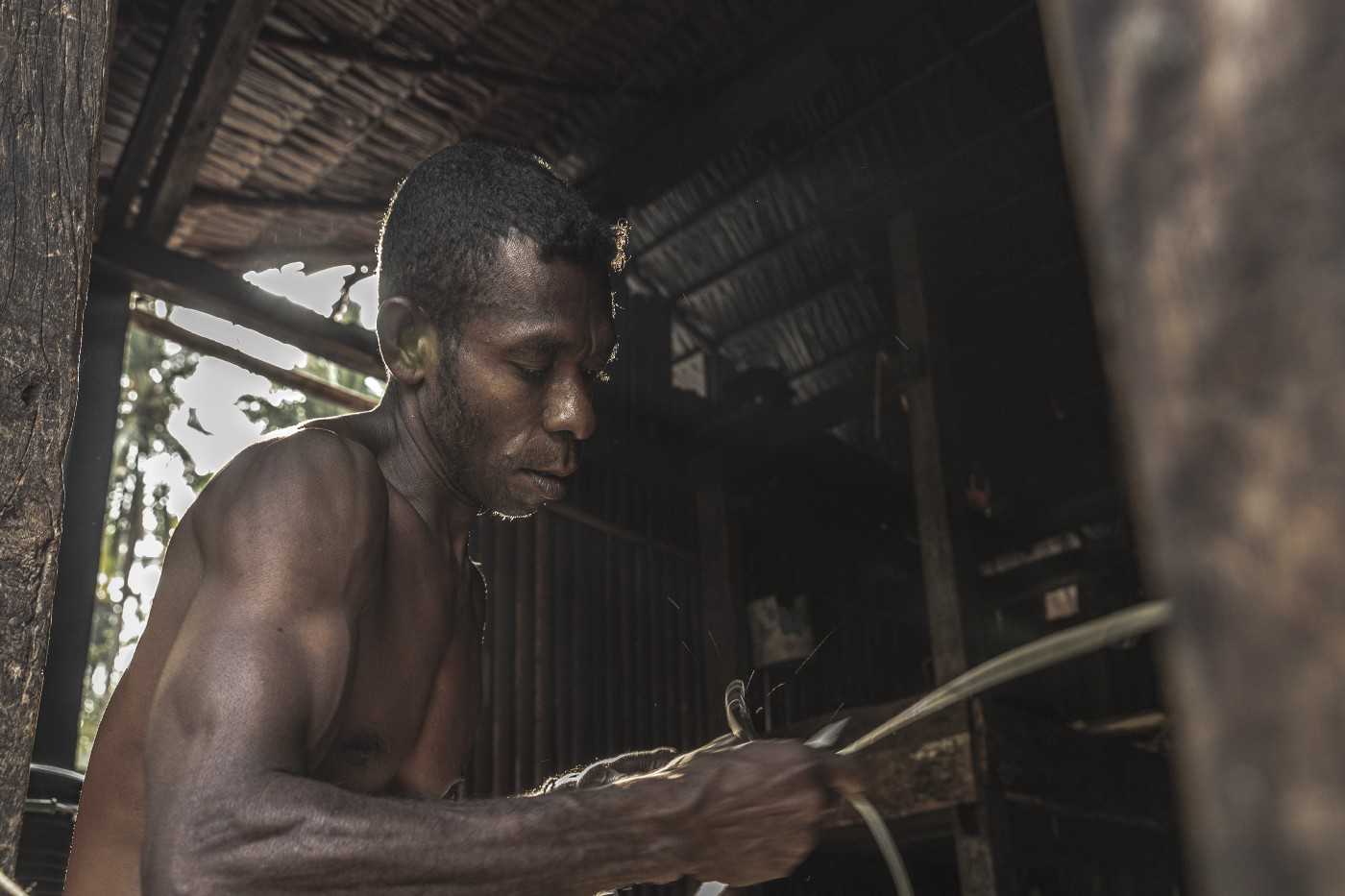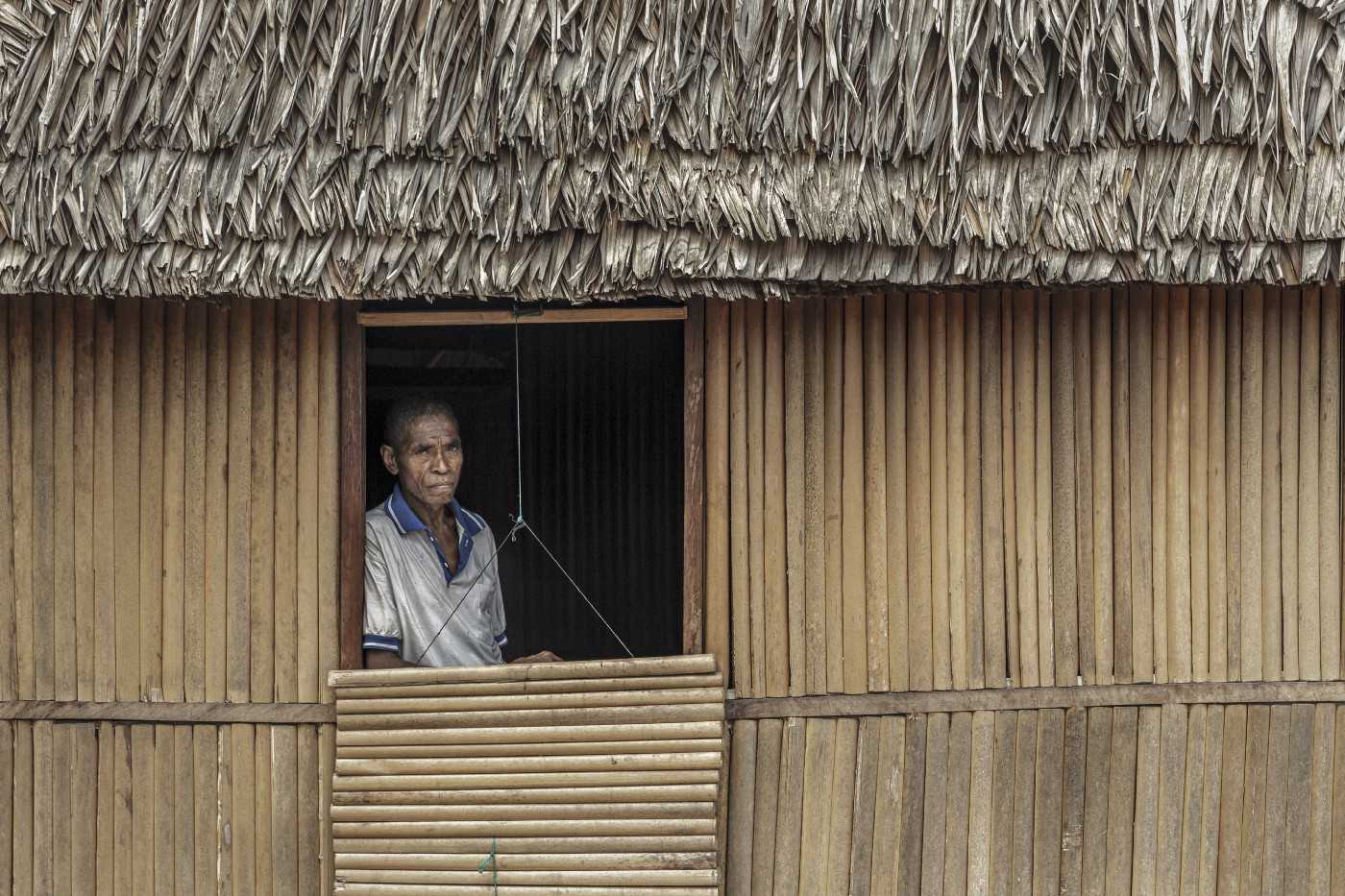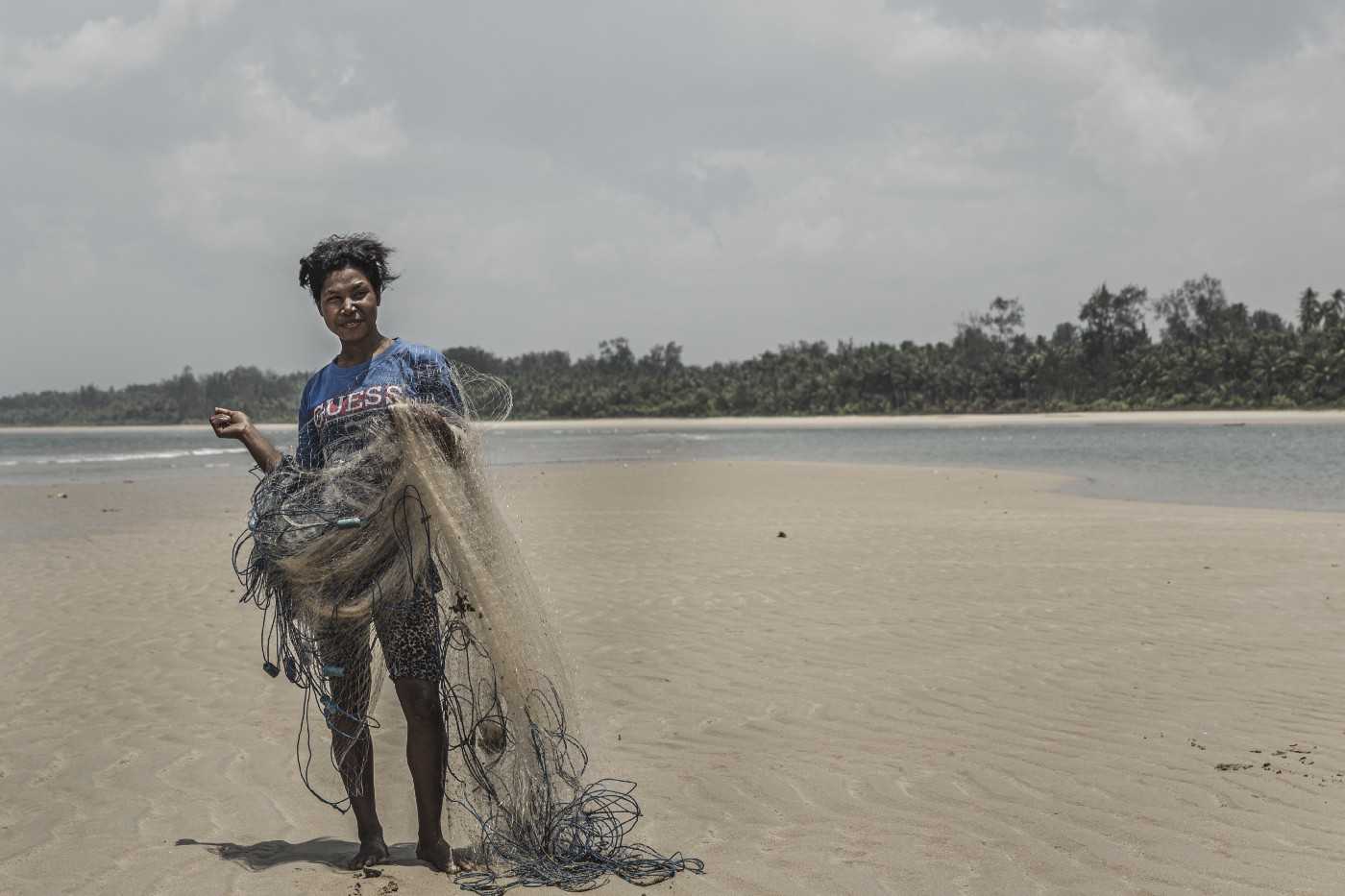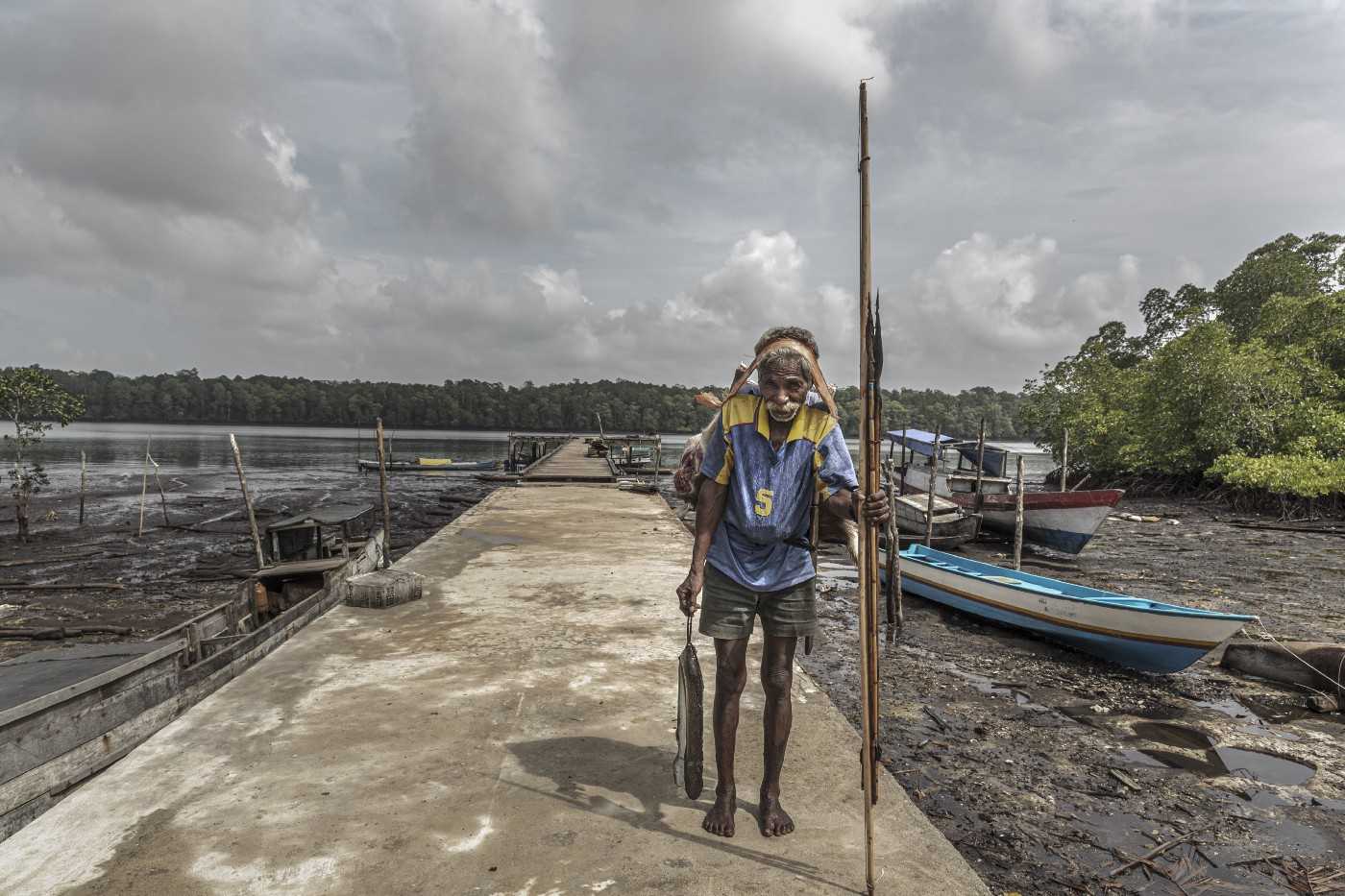When the people of Aru discovered that most of the land in their islands was to be converted to a giant sugar plantation, it presented them with a dilemma familiar to rural people across Indonesia. On the one hand, they desired the investment, infrastructure and jobs that such a project might bring. On the other, they feared losing the farmland and forests that provided them with food and clean water.
In the end, based on what they had seen happen in other places targeted by agribusiness firms, they decided the trade-off would not be worth it. There was a certainty they would lose what they had, but a fear that the other side of the bargain would not be delivered. They would end up without their land, but also without the lucrative jobs, health care and education that the company, the Menara Group, had promised.
The Aruese organised against the project, mounting one of the most successful grassroots campaigns in modern Indonesian history. Working with more experienced activists in Ambon, the provincial capital, the Aruese forced the central government in Jakarta to cancel the project, though today they are wary of new threats to their land. You can read our article on the Save Aru campaign here.
Their decision to oppose the project did not negate a deep yearning for “development,” according to anthropologist Chris Chancellor, who traveled around the archipelago to research his master’s thesis while studying at Wageningen University & Research in the Netherlands. In many ways, what was remarkable about the movement was that a materially impoverished people were able to resist the lure of investment.
Instead, the Save Aru movement raised questions about what kind of development can work in places like Aru. It pushed back on the idea that the only way to improve the lives of the Aruese was to hand over all their land to a private firm, and to see their forests clear-cut.
We spoke to Chancellor about the dilemma the people of Aru faced, and what it tells us about the future for places like it.
The Gecko Project and Mongabay: You’ve traveled widely in Aru. What did you feel like people were missing or wanted in terms of development?
Chris Chancellor: Of course this is a very nuanced thing. You speak to people in [Aru’s main town of] Dobo, and they are more inclined to go along with the development narrative — “We need more investment in education and health care and anything industrial that’s going to bring jobs.” It’s nice to romanticise this autonomous subsistence lifestyle, but now people want their kids to have an education, they want to send them away to study at university, so they need actual money for that. It’s nice to be autonomous but now they have these new modern costs which require a cash income. So people are searching for that somehow.

People in Dobo are more inclined to go along with this development narrative. But if you speak to older adat [customary] leaders in more peripheral areas, they’re saying, “Look, this is our land, we have to protect the land for future generations. Maybe it’s OK to give our land temporarily for someone to use so we can get cash in the short term, but in the long term we need to keep control over this land because it’s the basis of our wealth, and the basis of future generations’ wealth.”
There’s also a spiritual aspect that’s important to people. The idea of ancestors who are guarding the land and looking over it also played a role in people’s thinking about whether to accept the Menara Group: “If we sell or give away our ancestral land, our ancestors will be angry with us; they are existing as spirits in the forest, and that will bring bad consequences for us, our crops will fail.” This was something expressed to me quite strongly in some cases.
But then you have lots of younger people, especially men, who have material goods like smartphones. So they see things online or on TV that they want, and they crave this Western-style development. The phrase you hear a lot is bangunan desa — “village development.” Everybody’s always “bangunan desa, bangunan desa, we have to do this.” But it’s very difficult to get a straight answer from people as to what that actually means. It’s just somehow this concept of development, they want it, and the most tangible aspects of that are things like infrastructure development. So they get funds from the government to build a bridge over a stream or a river, for example, or to build concrete roads connecting them to other villages.

One of the promises made by the Menara Group was to build a fish market in a remote area where two villages are located. There were lots of people who loved that idea. But other people who saw it from a broader perspective, looking beyond this bangunan desa vision, were saying, “That’s very nice, but who’s going to buy that fish? Because all of the customers are in Dobo. You build a fish market here, there’s a very limited population who’s going to be able to actually attend and buy fish.” You don’t need this fancy market to distribute fish if you’re living in a village with 300 people. It’s a pointless promise, but it plays on this desire for village development that doesn’t really have a clear direction. It’s just “development,” whatever that means.
And then you have people who just want jobs, they want a cash income, to be able to build their own house and things like this. But people in Aru are very mobile. Lots of youth go to the city, especially young guys, for labor work, so infrastructural work or construction work, but then they come back. So they go to Dobo for six months, they make their money, then they go back to village, and for six months they fish, or do the forest gardening, attending to these swidden plots with their families. Also lots of people had done work in plantations or mining in Papua, or people had worked in Sulawesi. So it’s difficult to say where their livelihood is really based and what they want in terms of that.

In your thesis, there was a young man from Aru who spoke of his “mixed feelings” about the Menara project. He had heard from some of the elders in his clan that the company posed a threat to their village. But he had also worked as a labourer in Dobo, and he was open to the idea of having work closer to home.
Exactly. That’s something to consider, that people still have this strong connection to home. Although people want development, they also like their original village, they like the state that it’s in. Maybe they want to make an income and go back there and help it to develop in some sense, but still keep this sort of village life aura.
For example, the people I stayed with in Dobo, they were disconnected from the Menara thing, just people who were renting a room in town. But the husband originated from Feruni [village]. He’d been working for the government in Dobo for 20 years, living in Dobo. But his retirement plan was to return to Feruni to build a house and spend his retirement there. It seems like this is a common sort of plan.
At the moment I’m helping another Indonesian student here in Wageningen with his thesis, and he’s writing about plantation labor in Kalimantan [Indonesian Borneo]. And one of the things that he writes is lots of migrant workers are from places like Aru, and lots of them have expressed this idea that they’re just there temporarily, they want a cash income, so that they can go back to their original villages, build a house, develop some land or even small-scale agriculture, and then live the rest of their lives like that. So there is still this dichotomy between people wanting development, but also liking this original way of life, if you can call it that.
Maybe that doesn’t provide very clear answers about what people want, but that’s the thing: a lot of people don’t know what they want, or they want different things. Which may seem conflicting, but that’s how people think.
Makes sense. And that seemed to be Menara’s strategy: to play to people’s desire for development, while not being clear about how the project would transform their way of life.
Exactly.
The young man who liked the idea of working closer to home; at the same time he acknowledged that he didn’t know very much about the project. The Save Aru campaign embarked on a huge effort to inform people all around Aru what the project would entail. And once people had that information, they said, “Oh we don’t want this.”
Exactly. The central source of information was the plantation company itself. Obviously there’s a huge information and power asymmetry there. One of the amazing things that the Save Aru movement did was to realise this, to see this tactic, and say, “OK, but we can also do the same thing. Why can’t we do it? We have much more local knowledge. We have networks, we have connections, people know us. Through family ties we have much more legitimacy and much more trust.” I think that really is the root of the success of the Save Aru movement in inciting opposition.
Read more: The indigenous people of Aru saved their rainforest from destruction. Here’s how.
Some of the people we talked to in Ambon said that people in Aru, the phrase that was used was “inferiority complex.” If you read Patricia Spyer’s anthropological writing about Aru, she talks about an ambivalent relationship with the forest and outside world that people in Aru have, and a stereotype of Aruese as being timid in the face of authority. Do you have any thoughts on this?
It’s interesting you say that, because it’s not something I was explicitly looking for or noticed. But on reflection, in Indonesia in general there is this stereotype of eastern people who are underdeveloped, especially places like Aru which are very isolated, or stereotypically having these more animistic beliefs and spirituality and connection with the forest. And I guess that could create shame vis-à-vis other Indonesians. But it’s not something that was in my mind. Maybe if I was there again then it would become obvious.
There was a clan leader that I was speaking to in Feruni, and he had a brother in Surabaya [a city on Indonesia’s most-populous island of Java], and the brother was very well educated and was somehow involved in the Menara campaign. So he was saying to his brother in Feruni, “Look, you need to support this project because this is development, and Aru needs to be developed.” This held a very big weight for the clan leader. He wasn’t sure about what the project would entail, but his main source of information was his educated brother in Surabaya, who’d been living in Surabaya for most of his life. And he was quite an old guy. That’s something that I guess you could call an inferiority complex, or just this very strong respect for outsiders who have some sort of connection in people’s minds to the developed world.
Also for me as a researcher going around, sometimes people looked at me as Javanese [Chancellor’s mother is Javanese], and sometimes people looked at me as a bule [Westerner], mainly the latter, but still you command much more attention and respect than anyone else in the area. I think that’s something you find across Indonesia, but maybe it’s more pronounced in Aru, because of this feeling that “we are underdeveloped and we need to be developed.” I had lots of informal conversations where we’re hanging around in the evening, and someone would ask what’s it like in England, this amazing land of development and grandiose lifestyles that people have heard about or seen on TV. “We want that, how do we get that?” That’s something that came up a lot in conversation.
Something I always tried to emphasise in my answers is materially it sounds quite nice, but actually I think you guys are much richer in terms of autonomy over your lifestyle. You don’t have to be in an office at 9, and you don’t have to be from 9–5 behind a computer, doing something that you don’t really like. You have much more freedom in this sense. Then people started to say, “OK, maybe we do.” They had never considered that perspective before. But still it’s something you come across everywhere.
Aru has got to be one of the most abundant places in Indonesia in terms of the food that people can pluck right out of nature. So the typical Aruese might not have a lot of cash, but they can find a big crab in the mangrove swamp to eat for dinner, say, or drink clean water for free. That pertains to how a company like Menara will make its pitch in a place like Aru. It paints a rosy picture of how the plantation will improve their lives, but it doesn’t explain how it will utterly transform their environment.
Exactly. And I think that’s also something the Save Aru campaign did very well, was to counter this narrative by pointing to examples. They were showing this film about Chico Mendes [a martyred Brazilian rubber tapper who fought against and was eventually assassinated by Amazon ranchers]. They showed it in some villages with Indonesian translation, and that really incited the sense that “No, we are rich, we should be proud of what we have and we need to protect it.” That sentiment was expressed to me by [Save Aru activist] Mika [Ganobal], but also I heard this from people in villages who had seen the film.
A Menara representative at one point told a roomful of Aruese “not to let themselves become like beggars with golden bowls,” arguing that they would remain poor unless they converted their natural wealth into money in the bank. This prompted a huge outcry from the people assembled, who shouted back that the Aruese were rich, that the real beggar was Menara since it kept making overtures to acquire their land despite being so roundly rejected. It’s a climactic moment in the article.
Something else which I’m not sure was even part of the Save Aru campaign, but which on the island of Trangan people told me about, was that there had been a case where an Ambonese coffee corporation had come in and permission had been granted by the local adat authorities to develop a coffee plantation there, and then there were all these promises, the classic ones like “your children will be able to study abroad or in Ambon or whatever, and we’ll build education facilities here, we’ll build health facilities here.” But actually what happened was, because the land that they got permission for was forested land, they just logged the land and then left. So there was nothing about coffee or anything. It was just that they just wanted timber, and this was their way in.
People had seen that, heard about it; also through intermarriage between clans, people in different villages, this story became very strong and became an example about how actually in practice there were very nice promises, but when it comes down to it they don’t play out and you are left poorer than before. This is now very degraded land which isn’t being used for anything. I think this was something that was very strong which the Save Aru campaign did very well was to connect to this, and show real-life examples. Because it’s all very well preaching to people, but if they can’t see something tangible, then often they can’t fully conceptualise the consequences.

